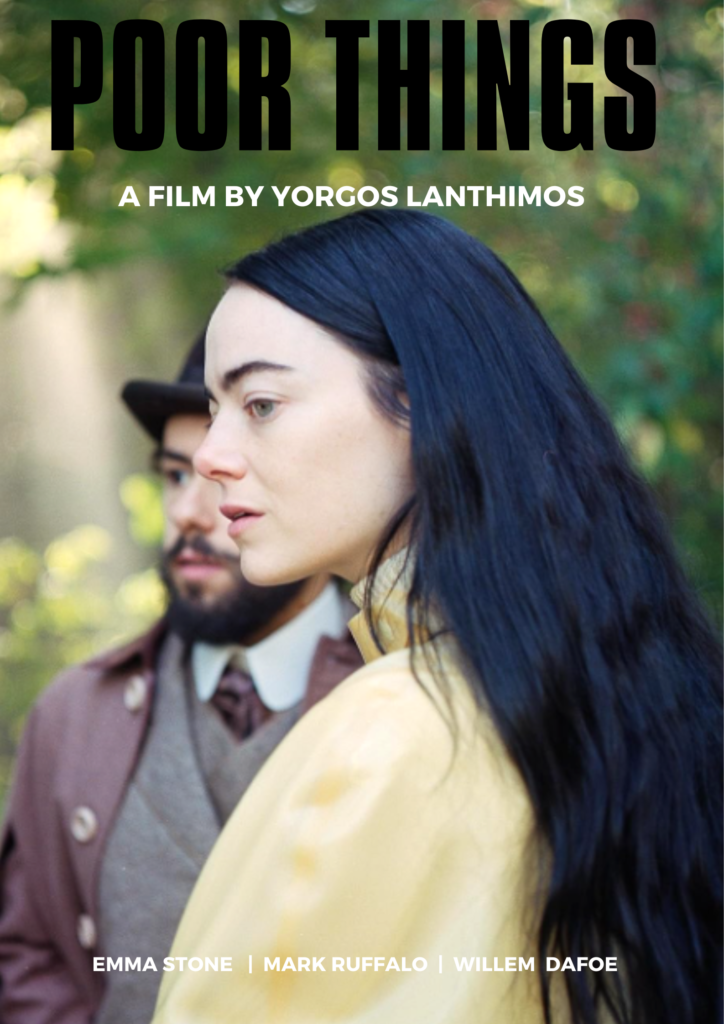
“Poor Things,” a film directed by the acclaimed Yorgos Lanthimos (“The Favourite”), invites audiences on an esoteric journey. Adapted from Alasdair Gray’s novel, the visually striking and thought-provoking movie boasts a stellar cast, including Emma Stone, Mark Ruffalo, Willem Dafoe, Ramy Youssef, Christopher Abbott, Kathryn Hunter, and Jerrod Carmichael.
Unconventional Resurrection: The Tale Unfolds
The narrative centers around Bella Baxter (played by Stone), a distressed woman who experiences an extraordinary resurrection orchestrated by Dr. Godwin Baxter (Dafoe), reminiscent of the Frankenstein mythos. Baxter replaces her brain with that of an infant, leading Bella to awaken with a child’s mind in a woman’s body. Eager to explore life, Bella’s journey takes an unexpected turn when she encounters Duncan Wedderburn (Ruffalo), sparking a whirlwind adventure and her sexual awakening.
Guided by Lanthimos and Stone: A Unique Arthouse Experience
Lanthimos and Stone, who also serves as a producer, guide the audience through a captivating journey in this unconventional arthouse film. The film’s settings evoke a sense of nostalgia, resembling older movies shot on soundstages with establishing shots featuring stop-motion animation. While the fantastical elements are digitally rendered, the film exudes a whimsical charm, somewhat akin to Wes Anderson’s style. However, unlike Anderson’s more whimsical and scripted approach, “Poor Things” combines fantasy with discomfort, challenging viewers to think and laugh.
Outstanding Performances: The Quartet Shines
The quartet of main actors—Stone, Ruffalo, Dafoe, and Youssef—deliver outstanding performances. Stone’s portrayal of Bella is particularly noteworthy, as she masterfully conveys wonder, curiosity, and innocence through subtle facial expressions and movements. Ruffalo’s Duncan undergoes a transformation from a charismatic playboy to a character with near-Nicolas Cage-level outbursts, portrayed with both sadness and comical endearment.
Unveiling Characters: Dafoe and Youssef’s Intriguing Dynamics
Dafoe and Youssef complement each other well, portraying interesting and lovable characters, although the film doesn’t delve deeply into their backgrounds. While Godwin Baxter’s mysterious mad scientist persona adds intrigue, Max McCandles (Youssef) remains less complex. The film raises questions about his motivations and activities in Bella’s absence.
Provocative Themes: A Journey into Feminism and Identity
“Poor Things” is not for the faint of heart, featuring explicit sex scenes and graphic operation sequences set in Baxter’s laboratory and at the university. The film addresses these elements with seriousness, using Bella’s experiences to explore themes of women’s sexuality, loss of identity, and independence. However, a potentially disturbing plot point regarding Bella’s early sexual experiences is left unaddressed.
Conclusion: A Cinematic Tapestry of Contemplation and Humor
In conclusion, “Poor Things” offers an intriguing perspective on the Frankenstein narrative and feminism, coupled with outstanding performances. The film’s blend of thought-provoking moments and humor, set against fantastical backdrops, makes it a unique cinematic experience. While the sexually explicit content and gore may not be suitable for all audiences, those comfortable with such elements will find a compelling exploration of complex themes. Viewing preferences aside, the film promises both laughter and contemplation, enhanced by its fantastical and visually appealing settings—ideal for those seeking an unconventional cinematic journey.